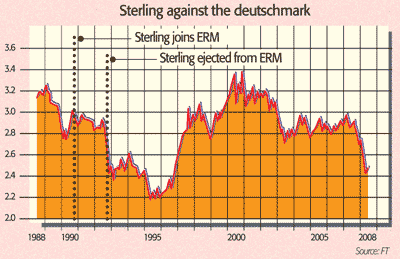Get the latest financial news, insights and expert analysis from our award-winning MoneyWeek team, to help you understand what really matters when it comes to your finances.
You are now subscribed
Your newsletter sign-up was successful
Want to add more newsletters?

Twice daily
MoneyWeek
Get the latest financial news, insights and expert analysis from our award-winning MoneyWeek team, to help you understand what really matters when it comes to your finances.

Four times a week
Look After My Bills
Sign up to our free money-saving newsletter, filled with the latest news and expert advice to help you find the best tips and deals for managing your bills. Start saving today!
The pessimists warning of a short-lived, or chronically weak, single currency at the European Central Bank's inception in June 1998 have so far been "spectacularly wrong", as Edward Hadas notes on Breakingviews. The ECB has established itself as a credible central bank, with the euro flying high against its major rivals; eurozone inflation is lower than in the previous decade and the euro accounts for 27% of global forex reserves.
Meanwhile, sterling has slumped as the British economy has hit the skids, and, as Lex points out in the FT, sterling is now worth the equivalent of 2.44 deutschmarks, 16% below the ERM entry level "a competitive rate to lock in for exporters". Consumer prices over the past year and growth rates since 2004 have been similar to the eurozone's, suggesting Britain has been converging with the eurozone. Given all this, the question of Britain joining the euro has re-emerged.
We're better off out, says the FT's Martin Wolf. Granted, entry seems plausible at current exchange rates and real interest rates have been higher here since 1999. But setting our own rates allowed us to restrain the credit bubble a bit; the eurozone's lower rates would have led to an even bigger boom and inflation and credit "overshoot". With the spending boom over, at least the falling pound can cushion the blow. Eurozone states in the same trouble don't have this option.
MoneyWeek
Subscribe to MoneyWeek today and get your first six magazine issues absolutely FREE

Sign up to Money Morning
Don't miss the latest investment and personal finances news, market analysis, plus money-saving tips with our free twice-daily newsletter
Don't miss the latest investment and personal finances news, market analysis, plus money-saving tips with our free twice-daily newsletter

Moreover, consumer prices between 1998 and 2008 rose by 18% here, the same as in Germany and less than France's 20%, while GDP in 1999-2008 has grown by 28%, against 21% in the eurozone. "Remaining outside preserves the safety valve of currency flexibility, while losing nothing in economic performance."
In any case, the eurozone is heading for turbulence. Growth is on the slide, credit conditions are beginning to tighten and economic sentiment hit a near three-year low in April. And unemployment has now ticked up in Germany, boding ill for already fragile consumer confidence which in France has hit a 20-year low.
The main problem, however, is the divergence between the periphery and the core. Portugal, Spain, Greece and Italy have become increasingly uncompetitive over the past few years due to the strengthening euro, racking up large current account deficits (around 9%-10% last year in the former three countries) that have dragged down the zone's trade performance. The eurozone had a seasonally adjusted record current-account deficit of e15.3bn in March. In Spain, Ireland and Greece shrinking competitiveness has been masked by spending sprees induced by housing bubbles: prices rose threefold in Spain between 1997 and 2007.
But now these have burst, with Spanish prices down 15% since September, and both countries look set for a nasty slowdown. With no control of interest rates and the hawkish ECB unlikely to cut rates soon, and without the option of devaluing their currencies, only cutting wage costs to improve competitiveness can help the periphery in the medium term. That means following in Germany's footsteps by clamping down on labour costs real German unit wage costs have stayed steady for a decade. But that also implies a severe slowdown: Germany only grew by an average of 0.6% in 2001-20005, says Wolf.
"As the boom-bust cycle turns ugly" the likely upshot is "a lot more irascible finance ministers" in the eurozone, as Wolfgang Munchau puts it in the FT. Political pressure on the ECB to water down its inflation targets and dash for growth may mount, denting its credibility and the currency. The pressure of adjusting to internal divergences may prove too much for some. "It is no coincidence," as BNP Paribas pointed out earlier this year, "that all failed currency unions were abandoned during times of economic stress."
Get the latest financial news, insights and expert analysis from our award-winning MoneyWeek team, to help you understand what really matters when it comes to your finances.
MoneyWeek is written by a team of experienced and award-winning journalists, plus expert columnists. As well as daily digital news and features, MoneyWeek also publishes a weekly magazine, covering investing and personal finance. From share tips, pensions, gold to practical investment tips - we provide a round-up to help you make money and keep it.
-
 Can mining stocks deliver golden gains?
Can mining stocks deliver golden gains?With gold and silver prices having outperformed the stock markets last year, mining stocks can be an effective, if volatile, means of gaining exposure
-
 8 ways the ‘sandwich generation’ can protect wealth
8 ways the ‘sandwich generation’ can protect wealthPeople squeezed between caring for ageing parents and adult children or younger grandchildren – known as the ‘sandwich generation’ – are at risk of neglecting their own financial planning. Here’s how to protect yourself and your loved ones’ wealth.

